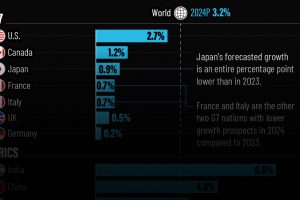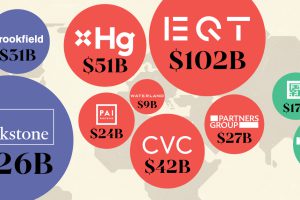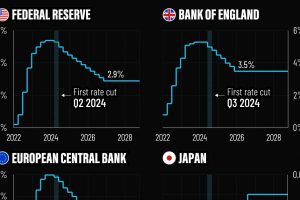The Largest Stock Markets Over Time, by Country (1970-Today)
This was originally posted on Advisor Channel. Sign up to the free mailing list to get beautiful visualizations on financial markets that help advisors and their clients.
For decades, the U.S. has firmly remained the world’s financial power.
But how long will this continue, and what factors could underscore a new shift? To look at the role of the U.S. in the broader financial system, this graphic shows 50 years of global stock markets, with data from Credit Suisse.

window.onload = function() {
if (window.location.href.includes(“/sp/”)) {
var vcSpNewsletter = document.querySelector(“a.vc-newsletter”);
vcSpNewsletter.style.display = “none”;
} else {
var voronoiAd = document.querySelector(“.visua-post-bottom.visua-target”)
voronoiAd.style.display = “none”;
}
};
Global Stock Markets Today
Today, the U.S. covers 58.4% of global equity markets as of year-end 2022.
| Top Stock Markets | Share of Global Stock Market 2022 |
|---|---|
| 🇺🇸 U.S. | 58.4% |
| 🇯🇵 Japan | 6.3% |
| 🇬🇧 U.K. | 4.1% |
| 🇨🇳 China | 3.7% |
| 🇫🇷 France | 2.8% |
| 🇨🇦 Canada | 2.7% |
| 🇨🇭 Switzerland | 2.5% |
| 🇦🇺 Australia | 2.2% |
| 🇩🇪 Germany | 2.1% |
| 🌎 Others | 15.2% |
The next largest stock market is Japan, at 6.3% of the global market share.
For a brief period in 1989, it overtook the U.S. when the Nikkei hit an all-time high following supercharged economic growth. However, after its subsequent crash and “lost decades”, it would take 33 years for Japan’s stock market to recover to those same highs.
Lastly, despite China being the world’s second-largest economy, it only accounts for just 3.7% of the world’s equity market share, a similar level as the UK.
Rise and Fall
Stock markets have been around for centuries.
While the New York Stock Exchange originated in 1792, Amsterdam’s stock market, arguably the world’s oldest, dates back to 1602.
During the mid-1700s, London began to overtake Amsterdam as a leading financial market amid growing financial activity and trade. An increasing number of firms set up offices in the city, bringing with them key business relationships.
After roughly 200 years, London’s role as a global financial center was surpassed by New York after WWII, driven by the economic crisis caused by the war.
America’s rise in prominence was supported by the growing credibility of the Federal Reserve, while the global status of the Bank of England diminished as the value of the pound weakened.
Given the destabilizing effects of the war, the U.S. filled the vacuum, emerging as a leading stock market supported by a robust economy and central bank—a position it continues to hold.
What Comes Next?
Why is America’s influence over global stock markets unrivaled?
The dollar’s status as a reserve currency plays a central role, along with the depth of its financial markets. Its economic, political, and military strength are other important factors.
America’s stock market returns have also outperformed nearly all other countries since 1900, attracting investors both domestically and abroad.
While American “declinism” has become a cliche, countries have risen and fallen over history. In the early 19th century, Britain’s publicly held debt soared from 109% of GDP in 1918 to roughly 200% by 1934. By around this time, its economic output had been exceeded by America, Germany, and the Soviet Union.
While there are key differences between the U.S. and Britain at that time, history suggests that balances in military power, debt, and economic dominance were key variables in the rise and decline of financial powers.

window.onload = function() {
if (window.location.href.includes(“/sp/”)) {
var vcSpNewsletter = document.querySelector(“a.vc-newsletter”);
vcSpNewsletter.style.display = “none”;
} else {
var voronoiAd = document.querySelector(“.visua-post-bottom.visua-target”)
voronoiAd.style.display = “none”;
}
};





